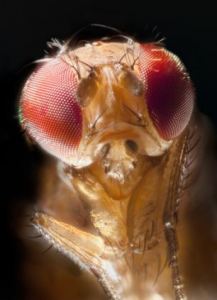If you’ve ever been told that you have the “memory of a fruit fly,” take it as a compliment. The common fruit fly, or the Drosophila melanogaster, is used as the model for researching memory issues in humans.

That’s because fruit flies have ‘rapid life cycles,’ as well as similar genes to humans that are used in their memory development processes. Specifically, the rapid life cycles allow scientists to study many generations of fruit flies within a short time frame. Secondly, scientists have discovered that although we are very different from fruit flies, the proteins that are found in the genes that form our memory consolidation… or conversion of short-term to long-term memory… are incredibly similar. That makes the Drosophila the perfect specimen for studying memory problems.
In short, the mating habits of fruit flies are studied. Drosophila memory is scent-based and the male knows NEVER to approach a female again, once she gives him a rejection-scent. Therefore, scientists use the combination of smell and electric shock to test the issues of memory. The Drosophila are exposed to specific odors, which may or may not be combined with electric shock. The scientists study memory by observing the processes that the flies follow while choosing between (and remembering) negatively-shocked scents versus safe scents.
Memory Loss
Let’s take the issue of short and long term memory. Scientists at The Scripps Research Institute in Florida have been studying memory loss in ‘aging fruit flies.’ They learned from the fruit fly research that long-term memory impairment is due to the loss of connectivity between neurons and NOT because of functional defects. In a ScienceDaily online article, Ron Davis, Department of Neuroscience Chair at The Scripps Institute says, “…to improve memory, we’re going to have to think of ways of rebuilding those connections.”
Sleep and Memory
Researchers have discovered that quality sleep is critical for converting short-term to long-term memory, again, based on the research of studying fruit flies. They learned that memory is ‘consolidated’’ (converted from short-term to long-term memory) in sleep when the mind is quieted. Researchers Paula Haynes and Bethany Christmann from the Griffith Lab at Brandeis University conducted research on the memory consolidation of fruit flies. They learned that when the flies’ memory consolidation neurons (dorsal paired medial neurons) were active, the flies slept. By contrast, when the neurons were deactivated, the flies were awake, active, and buzzing.
Power Naps
Most of us have challenges remembering things when we have not had enough sleep. Remember doing all-nighters in college while studying for exams? How did it work out for you? This latest research is showing that staying up all night to remember facts for a test is a bad idea. Instead, it would have been more lucrative to study and then get a good night’s sleep before the test.
Not only that, researchers at Saarland University have demonstrated that even a short power nap of 45 to 60 minutes will significantly enhance your memory. In research led by Professor Axel Mecklinger, 41 participants were given single and word pairs to memorize. Afterwards, half of the group slept for an hour, while the other half watched a DVD. Those who had taken a nap scored significantly better on a retest than the ones who had watched the DVD.
Appreciation for All of Life
Most people may have little value for a fly, much less for a fruit fly, but perhaps there will be more respect and appreciation for them, once they realize the incredible areas of understanding that are being gleaned from studying these little critters. After all, we share this beautiful place called Earth and there is a place and purpose for each of us. Although, I don’t necessarily appreciate it when the fruit flies take residence in my fresh fruits and vegetables…
